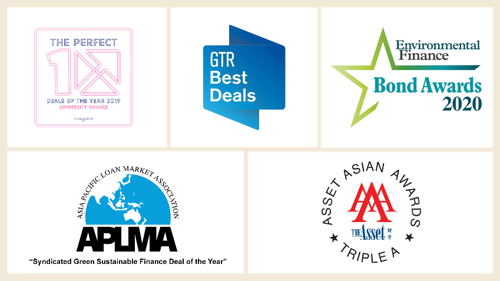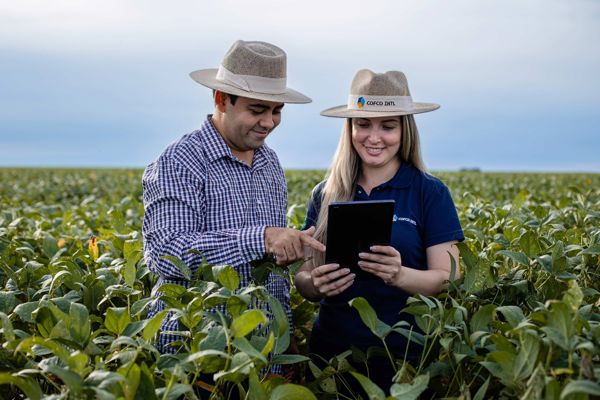
COFCO International wins multiple awards for sector-leading sustainability-linked loan
COFCO International has won another award in recognition of its sector-leading sustainability-linked loan. The TXF 2019 Overall Commodity Finance Deal of the Year Award is the latest in a series of accolades honouring the company’s commitment to placing sustainability at the core of its business.

Agreed in 2019 with a consortium of 21 global banks, COFCO International’s $2.3bn sustainability-linked loan is the largest ever for a commodity trader.
By hitting annual performance targets on important social and environmental topics and traceability progress, COFCO International gains interest discounts to be invested in its sustainability efforts.
“We’re delighted to be recognised by the financial sector for leveraging financing to further integrate and reinforce our sustainability objectives across the company,” says Paul van Spaendonk, Head of Financing at COFCO International, who oversees the company’s working capital investments and played a leading role in negotiating its loan with the participating banks. “Establishing a sustainability-linked loan as our core credit facility, and with so many of our key banking partners, is a landmark achievement for COFCO International. We are determined to continuously improve our performance and deliver on our public commitments.”
Towards progress, one year on

COFCO International has made strides to fulfil its commitments under the loan – and therefore its sustainability strategy – laying the foundations for progress. In particular, in 2019, the company achieved 98% traceability to farm for all direct soy sourcing in 25 priority municipalities in Brazil’s Cerrado, and has set a goal to achieve full traceability to farm for all directly sourced Brazilian soybean by 2023.
The company has also made good progress towards other environmental and social commitments under the loan. For example, it has strengthened its environmental policy and formalised its target to reduce production water intensity by 10% by 2025. Similarly, in 2019, COFCO International initiated a partnership with an international NGO to conduct human and labour rights impact assessments across its operations and key supply chains.
Delivering greater traceability
Increasingly, stakeholders – including major food manufacturers and consumers – want to know how ingredients were produced and where they came from. Achieving this depth of insight requires a significant amount of ‘detective work’ in the supply chain. COFCO International has stepped up to the challenge of tracing raw materials back to their source, with a particular focus on understanding the social and environmental risks that may occur at production level.
In 2019, the company invested in enhancing its internal systems and training its teams to collect, validate and record key information relating to suppliers’ individual farms. This was an extensive exercise requiring in-depth knowledge of suppliers’ production land and practices. Given the significant volumes of soy sourced by COFCO International from thousands of farmers, this was far from an easy task.

“To fully understand the risks we face in our supply chain and take action to address them, we must first have absolute clarity on where commodities are produced,” explains Wei Peng, Head of Sustainability at COFCO International. “Above all, we had to link each consignment specified in suppliers’ contracts with an exact location on the map, and establish that the volume delivered could have indeed been produced by this farm.”
“Our soy buying teams maintained constant contact with farmers on the ground to deliver the level of precision we required,” she continues. “And our push for traceability has involved collaboration across the company, from origination teams to contract management, trade, sustainability and logistics. It was truly a team effort.”
And the strategy is working. A recent independent audit confirmed that COFCO International has successfully achieved its Year 1 soy traceability target under the loan. Meanwhile, new commercial opportunities are opening.

“Achieving improved traceability enabled us to respond quickly in 2019 to new Brazilian legislation on traceable and sustainable biodiesel, as the country steps up its requirements for minimum biodiesel content in diesel fuel,” explains Peng. “As a result, our crushing plant in Rondonopolis was among the first plants to sell biodiesel under the RenovaBio sustainability certification.”
Looking ahead
COFCO International will build on the robust foundation established in Year 1 to make tracing large volumes of soy a reality, and rapidly – to fulfil the next two years’ loan targets. Informed by greater visibility of how and where the soy is produced, the company will deepen its focus on assessing farmers’ environmental and social performance and building farmers’ capacity. Additionally, COFCO International will research further opportunities to enhance resource efficiency within its operations, among other sustainability commitments covered by the loan terms. And there will be more to come on sustainable finance, too.
“By moving ahead of the curve to link finance and sustainability, we are acting at the forefront of a movement that will likely become standard practice in the future,” concludes van Spaendonk. “Working with our banks, we will continue to identify opportunities for both sustainability-linked loans and innovative joint solutions to help farmers gain access to the finance and services they need to invest in sustainable agriculture.”
For more information on COFCO International’s sustainability strategy, please visit: cofcointernational.com/sustainability/
